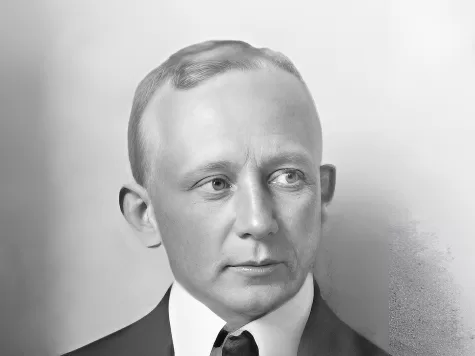Hans Freyer (1887–1969) is one of the lesser-known thinkers of the German Conservative Revolution movement that existed in Germany during the interwar period. Hans Freyer was a very important sociologist active in the first half of the 20th century, who played a major role in the development of German academic sociology. Freyer began studying economics, history, philosophy, and theology at the University of Greifswald in 1907. He later moved to Leipzig, where he pursued a career in philosophy and sociology. He obtained his doctorate in 1911, then qualified as a teacher in 1920, and two years later became professor at the University of Kiel. In 1925, Freyer moved to the University of Leipzig, where he founded the university’s department of sociology, which he headed until 1948. Most of what is known in the English-speaking world about Freyer is thanks to the American historian Jerry Z. Muller, who wrote the book The Other God that Failed: Hans Freyer and the Deradicalization of German Conservatism.
Like many of the German Conservative Revolutionary thinkers, Freyer’s legacy became tarnished by his relationship to the National Socialist government in Germany. Despite Freyer’s extensive bibliography, only one of his works, Theory of Objective Mind: An Introduction to the Philosophy of Culture, has been translated into the English language. That is until now. Thanks to Imperium Press, we now have another one of Freyer’s important works translated into the English language — Revolution from the Right (Die Revolution von rechts).
 Revolution from the Right provides a unique sociopolitical analysis of right-wing movements and their potential for societal transformation. Published in 1931, the book explores the historical, cultural, and ideological factors that contribute to the rise of right-wing ideologies and their impact on social order. In this essay, we will delve into the key themes of Revolution from the Right, examining Freyer’s insights into the nature of right-wing movements and their implications for political and social development.
Revolution from the Right provides a unique sociopolitical analysis of right-wing movements and their potential for societal transformation. Published in 1931, the book explores the historical, cultural, and ideological factors that contribute to the rise of right-wing ideologies and their impact on social order. In this essay, we will delve into the key themes of Revolution from the Right, examining Freyer’s insights into the nature of right-wing movements and their implications for political and social development.
Freyer situates Revolution from the Right within the turbulent period of the early 20th century, characterized by societal dislocation and political upheaval. He argues that right-wing movements arise as responses to social dislocation and the breakdown of traditional social orders. Freyer identifies the disorientation caused by industrialization, urbanization, and the erosion of traditional norms and values as catalysts for the emergence of right-wing ideologies. He explores how economic, cultural, and political transformations create a sense of alienation and discontent, which right-wing movements seek to address.
Freyer offers a critical assessment of liberal democracy, highlighting its perceived failures and limitations. He argues that liberal democracy’s emphasis on individualism, market capitalism, and the protection of individual rights can lead to social fragmentation and a loss of collective identity. Freyer contends that right-wing movements provide an alternative vision of social cohesion, emphasizing communal values, collective identity, and the authority of the state. He challenges the notion of democracy solely as a system of governance and argues for a deeper understanding of the societal conditions necessary for a sustainable democratic order.
A central theme in Revolution from the Right is the importance of cultural traditions and nationalism within right-wing movements. Freyer explores the role of cultural heritage, shared values, and historical consciousness in fostering a sense of belonging and collective identity (the folk). He argues that right-wing ideologies often emphasize the preservation of national identity, cultural traditions, and social cohesion. Freyer’s analysis highlights the tension between the universal ideals of liberal democracy and the particularistic aspirations of nationalist movements, providing a nuanced understanding of the complexities of identity and the challenges faced by multicultural societies. Quoting Freyer, “This industrial society is now confronted by the folk as its antagonist.”
In Revolution from the Right, Freyer addresses the crisis of modernity and the search for new sources of legitimacy. He contends that right-wing movements emerge in response to the perceived failures of modernity, including moral relativism, materialism, and social fragmentation. Freyer explores how these movements seek to establish alternative frameworks of legitimacy that prioritize collective values, cultural heritage, and the restoration of traditional norms. His analysis highlights the challenge of reconciling the aspirations of right-wing movements with the principles of liberal democracy and the complexities of societal transformation.
Revolution from the Right provides a thought-provoking analysis of the sociopolitical dynamics underlying right-wing movements. Through his exploration of historical context, critique of liberal democracy and industrial society, emphasis on cultural traditions and nationalism, examination of leadership and authority, and consideration of legitimacy in the crisis of modernity, Freyer offers insights into the complexities of right-wing ideologies and their potential for societal transformation.
By examining Revolution from the Right, we gain valuable insights into the conditions that give rise to right-wing ideologies, the challenges they pose to established norms and institutions, and the complexities of balancing collective identity with individual liberties. Freyer’s work prompts us to reflect on the tensions between tradition and modernity, nationalism and universalism, and leadership and democracy.
As we navigate the complexities of the contemporary political landscape, Freyer’s analysis invites us to critically examine the foundations and assumptions of industrial society and to strive for culturally resilient societies that uphold the collective welfare of the folk. With that said, I highly recommend you pick up a copy over at Imperium Press and I will leave you with this final quote from Freyer:
Revolutionary forces carry a new state within themselves as the substance of their will. They often do not know it, but they do it. Even when they loudly and fundamentally proclaim their hostility to the state, they always mean only that state which is the shell of or instrument of present society. But wrapped up in their direct actions and in their anticipatory demands, they carry the idea of their state. Every advance of their revolution makes this idea more concrete, more pictorial, more conscious. And the historical victory of their principle consists in the substitution of the new state for the old.





This is a really powerful quote, “Revolutionary forces carry a new state within themselves as the substance of their will. They often do not know it, but they do it. Even when they loudly and fundamentally proclaim their hostility to the state, they always mean only that state which is the shell of or instrument of present society.”
I’d wager that all politics, up until very recently, were guided by this timeless spirit.
I am trying to study the German Conservative revolution authors. While Freyers seems less radical, still added to my list.
Was he an open National Socialist? Or just not opposed to NS? It seems like he had a University position before, during, and after the war.
In 1933, he signed the vow of allegiance to Hitler (as most university professors did). Like many of the German Conservative Revolution thinkers, Freyer was initially optimistic about the NSDAP, however, eventually became a critic of NS. After the war, Freyer was regarded as being one of the progenitors of NS ideology (an allegation made against many GCR thinkers). It wasn’t until Armin Mohler wrote his book about the German Conservative Revolution that people were made to see that it was a separate movement from NS.
Doesn’t Bolton have a book with the same name?
Kerry Bolton has a book titled ‘Revolution from Above’
Exactly what we are fighting for!
A new author for me. Raynor has made me want to explore his work! We certainly need a revolution from the right today. The sooner, the better!
Excellent. I love these articles that introduce the reader to new thinkers, new books, new perspectives… “new” to the English-speaking world, that is.
I’m definitely getting a copy of Revolution from the Right.
I feel the same way! It’s really nice to be exposed to fresh ideas here at Arktos.
Some of this is a little too academic for me, but it is great these figures are not forgotten.
How so @EuronNat?
I do agree that we shouldn’t forget these important historical figures.